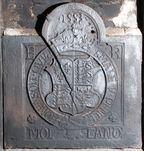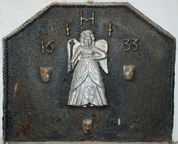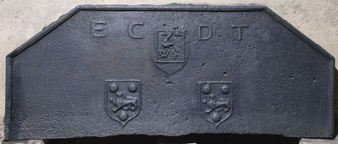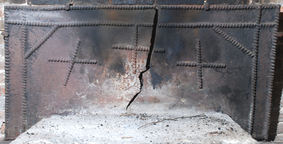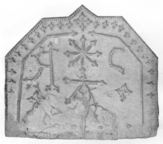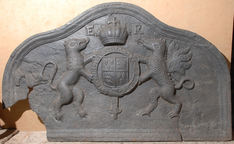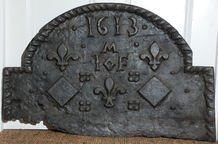-
60
Description: Fragment; rectangular; flanged top edge; probable symmetrical arrangement of crowned Tudor royal shield stamps (4 above 3); vertical line on either side of each shield; left hand print in bottom left corner, probably mirrored on right.
Notes: The right side of the fireback is missing. Very crude modelling of stamp suggests an early date; the same crowned shield and use of hand print can be seen on a fireback at Rolvenden (no. 661), indicating a common source..
- Decoration tags:
- rectangular (shape)
- flanged (edging)
- simple stamps
- carved stamps
- heraldic
- humans
Manufactured: in the early- to mid-16th century in the Weald area of England.
Current location: in private hands, Etchingham, East Sussex, England.
- Attached to series:
- Hand print firebacks
- Early Tudor series
- Tudor royal armorial firebacks
-
288
Description: Arched rectangular with plain edges; arched rectangular inset with cavetto edging and armorial design in low relief: circular garter enclosing an ornate Tudor royal shield, surmounted by a crown; date inside top of arch; initials inside top corners of rectangle; a rose in each bottom corner of rectangle; inscription in a separate rectangular panel below, split by garter buckle.
Notes: The earliest dated fireback in the English style. Molland was a Devon manor belonging to the Courtenay family. Noted as having been at Wells Deanery, Somerset, in 1845; a variant without the motto, the existence of which was noted in 1840, was illustrated by Llewellin (1863). The west country source for both of these firebacks offers the possibility of an origin in those parts.
Copies of this fireback are known.
Inscription: 1553 / E R / HONV SOIT QVY MALE V PENCE / MOL LAND
Arms: Tudor royal - Edward VI
- Decoration tags:
- rectangular with round arch (shape)
- none (edging)
- whole carved pattern
- armorial
- royal
- text
Manufactured: in 1553 .
Current location: Davington Priory, Priory Road, Faversham, Kent, England.
Citation: Collier, C. V., 1897, 'Coats of Arms in Kent Churches', Archaeologia Cantiana, 22, pp. 190-1.
- Attached to series:
- Edwardian royal armorial firebacks
- Tudor royal armorial firebacks
-
293
Description: Canted rectangle; inset twisted rope edging (top and sides); stamp formed of a statuette of an standing angel with left hand at the waist, and holding a sceptre in the right hand; date split either side of angel; initials in triad above angel; small face stamp repeated three times, one each side of angel, and one below.
Notes: The identity of those to whom the initials refer is not known; the use of the angel statuette is a rare inclusion of a religious motif on an English fireback. A variant of this fireback is at the Lygon Arms Hotel, Broadway, Worcestershire (no. 1027).
Inscription: IHI [triad] / 16 33
- Decoration tags:
- rectangular with canted top corners (shape)
- rope (edging)
- carved stamps
- individual letters
- individual numbers
- text
- humans
Manufactured: in 1633 in the Forest of Dean area of England.
Current location: Flaxley Abbey, Flaxley, Gloucestershire, England.
Citation: Bick, D. E. [incorrectly printed as Bick, R.], Sept 1985, 'Firebacks', Period Homes, pp. 21-4.
- Attached to series:
- Figurine firebacks
- Angel series
-
67
Description: Pediment and frieze resting on fluted Tuscan pilasters; plain podium base; rectangular central panel with double fillet edge divided into four with central panel containing initials; date in tympanum; narrow rectangular panels on each side from base to cornice.
Notes: An early example of the use of classical architectural elements in an English fireback.
Inscription: 1568 / ER
- Decoration tags:
- rectangular with pediment (shape)
- none (edging)
- whole carved pattern
- individual letters
- extension panels
- architectural
- text
Manufactured: in 1568 in the Weald area of England.
Current location: in private hands, Frant, East Sussex, England.
- Attached to series:
- 1568 Architectural series
-
68
Description: Canted rectangle; ovolo edging (top and sides); symmetrically arranged, initials separated by overpressed, fillet edged stamp bearing letters WF surmounted by a bent arm holding a battleaxe issuing from a chapeau; beneath are two shields bearing the arms of Fowle.
Notes: The shield and crest stamps relate to William Fowle (1568-1634) and are those used on iron grave slabs in Wadhurst and Frant churches and in Maidstone museum, as well as on other firebacks. The initials have not been identified. The fireback was formerly in Riverhall, Wadhurst, built by William Fowle. Another casting with the same set of initials, but in a slightly different arrangement, has been noted (no. 1077), and Christy (1908 p.386) reported on another with slots for two firedogs.
Inscription: EC DT / WF
Arms: William Fowle, of Frant and Wadhurst
- Decoration tags:
- rectangular with canted top corners (shape)
- astragal (edging)
- carved stamps
- individual letters
- heraldic
- armorial
- text
Manufactured: in the early- to mid-17th century probably at Riverhall Furnace, Wadhurst in the Weald area of England.
Current location: in private hands, Frant, East Sussex, England.
- Attached to series:
- Fowle series
-
69
Description: Rectangular; twisted rope edging (top and sides); twisted rope lengths parallel to top and both sides and crossing at corners, with shorter rope lengths across inside angles; shorter rope lengths arranged in three crosses across middle of plate, the middle one higher than the other two.
Notes: A particularly large and elaborate arrangement of rope lengths. The crosses suggest Christian significance.
- Decoration tags:
- rectangular (shape)
- rope (edging)
- simple stamps
- apotropaic
- objects
Manufactured: in the 16th century in the Weald area of England.
Current location: in private hands, Freshfield, East Sussex, England.
- Attached to series:
- Rope design firebacks
-
295
Description: Five-facetted arched shape; ovolo-moulded edging comprising two separate lengths of moulding repeated to form sides and arch; shield of Hickman (per pale indented argent and azure) impaling Nevile (?gules a saltire argent) within repeated laurel leaves inside a scrolled cartouche; date top centre.
Notes: William Hickman of Old Hall, Gainsborough, 2nd Baronet (1629-82), married Elizabeth Neville of Mattersey, Nottinghamshire, c.1652. The multi-facetted arch calls to mind a series of firebacks cast in the Weald which are also associated with the Nevills (see 1589 series), although they are of earlier date.
Inscription: 1658
Arms: Hickman impaling Neville; Sir William Hickman
- Decoration tags:
- multi-facet arched (shape)
- ovolo (edging)
- whole carved pattern
- individual numbers
- armorial
- text
Manufactured: in 1658 in England.
Current location: Gainsborough Old Hall, Gainsborough, Lincolnshire, England.
(part of the English Heritage museum group)
- Attached to series:
- Personal armorial firebacks
-
298
Description: Pentagonal with a small triangular arch, centre top; twisted rope edging (top and sides); in arch, cross formed of small fleurs-de-lys; row of small fleurs inside rope edging, lower half of sides plain; length of twisted rope each side, parallel to edges, with small fleur terminal at top end; upper centre, rope escarbuncle with fleur terminals between ‘R’ and ‘C’ (both of rope with fleur terminals, ‘R’ reversed); ‘A’ below escarbuncle (also rope with fleur terminals, with cross bar above); fleur cross below ‘R’.
Notes: Twisted rope with fleur terminals is seen on several firebacks with stamps otherwise associated; it is a form paralleled on firebacks from the Champagne area of France. The escarbuncle is the principal charge on the arms of the Duchy of Cleves, possibly associating this fireback with the brief marriage of Henry VIII and Anne of Cleves. Formerly at Warnham Court, Sussex; illustrated in Gardner 1898, p. 146.
Inscription: R A C [inverted triad]
- Decoration tags:
- rectangular with canted top corners and triangular arch (shape)
- rope (edging)
- simple stamps
- objects
Manufactured: in the mid- to late-16th century possibly at Pounsley Furnace, Framfield in the Weald area of England.
Current location: not known.
Citation: Gardner, J. S., 1898, 'Iron Casting in the Weald', Archaeologia, 56, 1, pp. 133-164.
-
303
Description: Rectangle with curved shoulders and low arch joined with concave curves; fillet and ogee moulded edging; central Tudor royal shield surrounded by garter, with crown above and lion and dragon supporters; royal initials either side of crown.
Notes: Damaged on bottom left corner; the garter motto includes ‘EQVI’ instead of ‘HONI’, making it meaningless; possibly ‘EQVI’ was a mis-transcription of ‘HONI’; the crown is distinctly continental in form; a much-copied fireback. Previously at Hoarthorns Farm, West Dean, Gloucestershire, where another fireback of the same design was recovered from a pond and is now at the Forestry Commission camp site at Christchurch, near Coleford.
Copies of this fireback are known.
Inscription: E R / EQVI : SOIT : QVI : MAL : Y : PENSE
Arms: Tudor royal - Edward VI or Elizabeth I
- Decoration tags:
- rectangular with round arch (shape)
- fillet and ogee (edging)
- whole carved pattern
- planklines
- armorial
- royal
- text
Manufactured: in the mid- to late-16th century in England.
Current location: Gloucester Folk Museum, Westgate street, Gloucester, Gloucestershire, England.
Museum number: GLRCM:F03526 (part of the Gloucester Museums museum group)
-
70
Description: Arched rectangular shape; simulated twisted rope edging (top & sides); symmetrical arrangement of fleurs de lys (two types - 2 and 1), diamond shapes (2) and cross-cut squares (4) includes the monogram in which the letters I and F are separated by a small, hollow diamond stamp, the M being above; interspersed symmetrical arrangement of raised spots (8).
Notes: The initials, as with other triple-lettered forms, in which the middle letter is set apart from the other two, may relate to a married couple where their surname initial is M. Another example seen has shown that the pattern was formed of five angular, uneven-sized planks battened together.
Copies of this fireback are known.
Inscription: 1613 / M / I F
- Decoration tags:
- rectangular with round arch (shape)
- simulated rope (edging)
- simple stamps
- carved stamps
- individual letters
- individual numbers
- planklines
- heraldic
- text
Manufactured: in 1613 in the Weald area of England.
Current location: Godalming Museum, Godalming, Surrey, England.
Museum number: B980.400 (part of the Godalming Museum museum group)
- Attached to series:
- Diamond series

